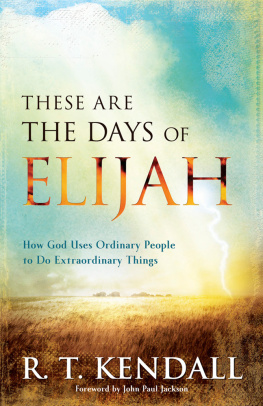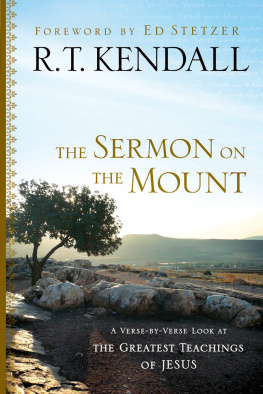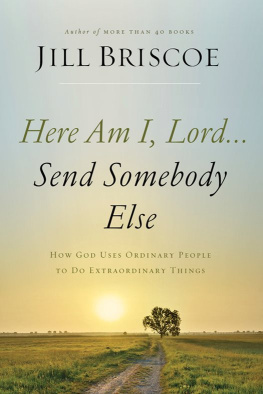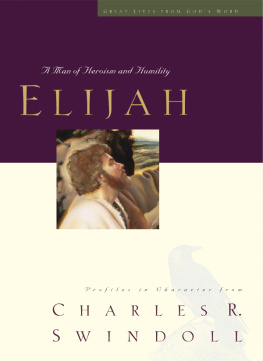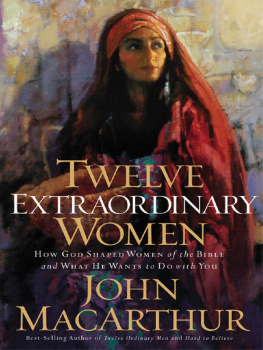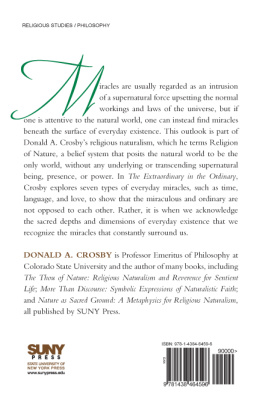
2013 by R. T. Kendall
Published by Chosen Books
11400 Hampshire Avenue South
Bloomington, Minnesota 55438
www.chosenbooks.com
Chosen Books is a division of
Baker Publishing Group, Grand Rapids, Michigan
www.bakerpublishinggroup.com
Ebook edition created 2013
All rights reserved. No part of this publication may be reproduced, stored in a retrieval system or transmitted in any form or by any meansfor example, electronic, photocopy, recordingwithout the prior written permission of the publisher. The only exception is brief quotations in printed reviews.
ISBN 978-1-4412-6127-4
Library of Congress Cataloging-in-Publication Data is on file at the Library of Congress, Washington, DC.
Unless otherwise indicated, Scripture taken from the HOLY BIBLE, NEW INTERNATIONAL VERSION. Copyright 1973, 1978, 1984 Biblica. Used by permission of Zondervan. All rights reserved.
Scripture quotations identified ESV are from The Holy Bible, English Standard Version (ESV), copyright 2001 by Crossway, a publishing ministry of Good News Publishers. Used by permission. All rights reserved. ESV Text Edition: 2007
Scripture quotations identified KJV are from the King James Version of the Bible.
The internet addresses, email addresses, and phone numbers in this book are accurate at the time of publication. They are provided as a resource. Baker Publishing Group does not endorse them or vouch for their content or permanence.
Cover design by Franke Design and Illustration
Contents
Cover
Title Page
Copyright Page
Endorsements
Foreword by John Paul Jackson
Introduction
1. The Oath
2. Knowing the Next Step Forward
3. The Unsurprising Disappointment
4. Faith Is Sometimes Spelled R-I-S-K
5. Coping with Being Misunderstood
6. When Things Start Happening Again
7. When God Seems Unfair
8. Gods Troubler
9. Elijahs Finest Hour
10. The Fire of God
11. The Sound of Rain
12. Running Scared
13. Elijah Gets Depressed
14. Touched by an Angel
15. The Elijah Complex
16. When God Speaks Softly
17. Evil, Justice and Mercy
18. A Prophets Vindication
19. Do You Really Want More of God?
20. Welcome Home, Elijah
21. In Conclusion: Elijahs Legacy
About the Author
Back Ads
Back Cover
Foreword
A braham Heschel once wrote, To be a prophet is both a distinction and an affliction. Elijah was no exception. Few prophets in Scripture have provoked as many ministers, challenged as many evangelists and inspired as many prophets as Elijah. This man from the desert, who seemed to be on the one hand invincible and on the other hand cowardly, was as much an enigma then as he is today.
He is unique. He could run faster than a horse-driven chariot. He is one of two humans in Scripture taken to heaven before they tasted death. He is the only one, other than Jesus, who, it is prophesied, will return to earth before the Day of the Lord. He is one of two who have seen the backside of God as He passed by. If that is not strange enough, he is the only one with an anointing great enough to call down fire from heaven. He was in the lineage of the ecstatic prophets, whose mere presence seemed to defy human anticipation, and to be determined solely by the Spirit of God rather than themselves.
Yet Elijah was also human, with emotions, fears, doubts and moments of elation, just like you and me. He lived in an era of high occult activity. He was a focal point in the clash between Yahweh and Baal, spurred on by Ahab, who sold himself to do evil, and even more so by Jezebel, who would stop at nothing, including murdering the innocent and worshiping demons, to get her way. Elijah stood up against the odds and proclaimed Mosaic righteousness when decadence was politically correct.
Elijah was a paradox, a walking contradiction of foresight and blindness, faith and fear, power and weakness. He killed 850 false prophets, yet ran from one woman. He demanded that a dying widow feed him before she fed herself and her son, then years later raised that son from the dead. Egocentrically he complained to God that he alone was left, and God had to burst that bubble by telling him there were seven thousand others who had not bowed their knees to Baal. He complained of hunger, ate food brought to him by ravens and walked two hundred miles to Mount Sinai after eating one loaf of bread that an angel baked for him.
Elijah taunted kings, complained to God, healed people and actually changed the course of nature. Elijah was a prophets prophet, a mans man with a nature just like yours and mine.
R. T. Kendall has captured a stable of hidden truths that lie behind the scenes in the life of this unique prophet and man of God. He unfolds how God took a weak man and transformed him into a giant. He discloses the importance of the overlooked, and he rightly positions God as the core of Elijahs life. R. T.s insight and biblical knowledge allow him to clarify the levels in which God speaks to and through prophets. That alone is worth a hundred times the price of this book.
R. T. has also unraveled the mystery of what I feel is the oft-overlooked crux of Elijahs ministry: He was a human being who dared to believe God would use him. That is not as simple as the novice might think. In These Are the Days of Elijah , R. T. Kendall has found a way of making the complex seem simple. He has untangled the knot that others have tried to untie and could not.
Every pastor, evangelist and teacher should read this book; and it is a must-read for all who believe they might have even a small modicum of prophetic gifting.
John Paul Jackson
Founder, Streams Ministries International
Introduction
E lijah was one of the most outstanding prophets of the Old Testamentand certainly the most colorful. He stands next to Moses, the greatest prophet of all. It was Moses and Elijah who appeared on the Mount of Transfiguration with Jesus (see Matthew17:3). These two men represented the Law (Moses) and the prophets (Elijah) of the Old Testament.
Elijah was in the succession of a new era of prophets beginning with Samuel. Between the time of Moses and Samuel the word of God was rare, which means that God had not raised up many to speak His word for a long period of time (see 1 Samuel 3:1). But with the emergence of Samuel a new kind of prophetic ministry was begun, anticipating men like Nathan (see 2 Samuel 7:2), Gad (see 2 Samuel 24:11) and Elijahand eventually the canonical prophets like Isaiah and Jeremiah whose words became Scripture.
Elijah was not a canonical prophet (there is no book in the Bible named after him), but his ministry and impact were unforgettable. Although his successor Elisha is said to have had double the anointing that was on Elijah (see 2 Kings 2:912), future generations remembered Elijah more than they did Elisha. He was mentioned at the end of the book of Malachi (see Malachi 4:56). Gabriel said that John the Baptist would go before the Lord in the spirit and power of Elijah (see Luke 1:17). When Jesus cried out in Aramaic, Eloi, Eloi, lama sabachthani , bystanders thought He was calling for Elijah (see Mark 15:3435).
Prophets were known as seers through the time of Samuel (see 1 Samuel 9:9). An example of the gifting of seer was Samuels discerning that Saul (before he was king) was trying to find some lost donkeys. Looking for the seer, they came upon Samuel who acknowledged his position and then addedbefore being told why he was being soughtAs for the donkeys you lost three days ago, do not worry about them; they have been found (1 Samuel 9:20).

